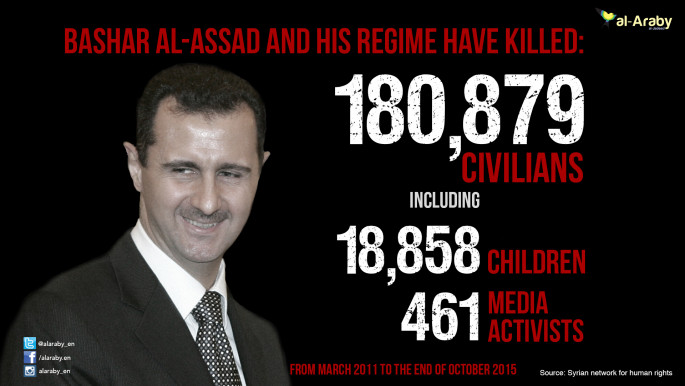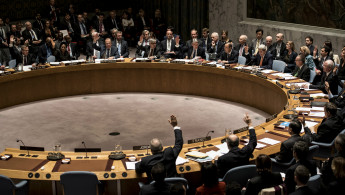Syria opposition sceptical over UN-backed peace plan
insisting that President Bashar al-Assad must go to achieve peace.
A United Nations-backed roadmap to end the Syrian war was met with scepticism on Saturday by members of the country's fractured opposition, who insist President Bashar al-Assad must go to achieve peace.
The United States and Russian initiative, unanimously approved by the UN Security Council on Friday, foresees talks between the rebels and the regime and a rapid ceasefire, perhaps even next month.
But the plan was described as unrealistic by the Istanbul-based National Coalition, the main Syrian opposition grouping.
The resolution "undermines the outcome of the meetings of revolutionary forces in Riyadh and waters down previous UN resolutions concerning a political solution in Syria," coalition head Khaled Khoja said on Twitter.
Fellow coalition member Samir Nashar said bombing by the regime and Russia must stop for there to be a sustainable ceasefire.
"Given the reality on the ground and the impasse on the fate of Bashar al-Assad, the agreement is absolutely not applicable," he said.
| Given the reality on the ground and the impasse on the fate of Bashar al-Assad, the agreement is absolutely not applicable - Samir Nashar |
The Security Council met after the latest round of talks by the International Syria Support Group (ISSG), which had gathered in New York to renew its push for peace.
"In January we hope and expect to be at the table and to be able to implement a full ceasefire," US Secretary of State John Kerry told reporters.
"And that means all the barrel bombs will stop, all the bombing, all the shooting, all the attacks on either side."
'Dangerous logic'
The United States and Arab allies remain convinced Assad must leave office as part of the process, but his allies Moscow and Tehran insist this is a decision for the Syrian people.
The resolution does not touch on this vital issue.
"We often hear the argument that without resolving the Assad question, it is impossible to truly coordinate in the fight against terrorism," Russian Foreign Minister Sergei Lavrov said.
"This is a dangerous logic, a dangerous approach," RIA Novosti news agency quoted him as saying.
Kerry - who has "agreed to disagree" with Moscow on Assad's fate - emphasised that victory over the Islamic State group hinges on a peaceful settlement in the broader Syrian civil war.
"We know that Daesh can never be allowed to gain control in Syria so we have a global imperative here to deal with a terrorist entity but also to end the civil war," he said, using an Arabic acronym for IS.
"President Assad in our judgement... has lost the ability, the credibility to be able to unite the country and to provide the moral credibility to be able to govern it."
But experts nevertheless see a narrowing of differences between the major powers.
"The West and Russia's position are coming closer together," Alexander Baunov, a political analyst at the Carnegie Moscow Center, told AFP.
"Russia would not have voted for a resolution in which it would have been written that Assad needs to step down. The absence of Assad is a form of compromise to get the resolution through."
'Ulterior motives'
Karim Bitar, head of research at the Institute for International and Strategic Affairs, described the UN-backed plan as "a very significant first step" but added that "many ambiguities and ulterior motives remain".
"Sunni regional powers still fear that this pragmatism perpetuates the status quo and allows Assad to stay too long during a transition period," he added.
The Security Council resolution calls for "free and fair elections" supervised by the United Nations within 18 months in which all Syrians, including those overseas, would be eligible to vote.
More than 250,000 people have died since Syria's conflict erupted in March 2011, and millions more have fled their homes.
Regime troops backed by Russian warplanes have sought to wrest back ground from Assad's opponents in recent weeks.
They suffered a setback Saturday as rebels managed to recapture a hilltop overlooking a strategic highway in Assad's coastal heartland, Latakia, just days after they were forced to retreat.
Eighteen pro-government fighters and several rebels were killed, according to the Syrian Observatory for Human Rights, a British-based monitoring group.
Friday's New York talks were the first by the ISSG since Saudi Arabia gathered a coalition of Syria rebel groups to form an opposition negotiating team.
Kerry said that there were still sharp disagreements between the ISSG parties, some of which sponsor armed factions on the ground, as to which groups should be banned.
Iran said it would work with Russia, Oman, Egypt, Turkey, Jordan and France to prepare a list of extremist groups it wants to see banned from talks.
"Terrorist groups have no place in this national dialogue," Deputy Foreign Minister Hossein Amir Abdollahian was quoted by the official IRNA news agency as saying.
 |
|
| [Click to enlarge] |





 Follow the Middle East's top stories in English at The New Arab on Google News
Follow the Middle East's top stories in English at The New Arab on Google News

![22 Arab countries at COP29 have rejected the targeting of fossil fuels [Getty]](/sites/default/files/styles/image_330x185/public/2024-11/GettyImages-2184289638.jpg?h=199d8c1f&itok=ptHl5bec)
![Dozens of people turned out for the funerals [Getty]](/sites/default/files/styles/image_330x185/public/2024-11/GettyImages-2185229760.jpg?h=e7c891e8&itok=1bctDcE6)